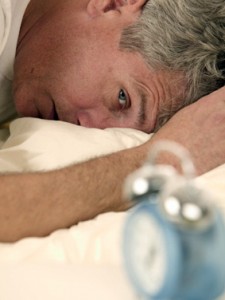 Many of my patients over the age of 45 will agree that getting a good night’s sleep can become more and more difficult as you get older. Interestingly, this is the same time when vision starts to become a problem for many people in that age group – and especially so for people nearing age 60 who may also start to get the early signs of cataracts.
Many of my patients over the age of 45 will agree that getting a good night’s sleep can become more and more difficult as you get older. Interestingly, this is the same time when vision starts to become a problem for many people in that age group – and especially so for people nearing age 60 who may also start to get the early signs of cataracts.
I encourage my patients to be proactive in preventing cataracts, and/or halt their worsening. I tell them about the link between chronic insomnia and vision problems and how they can prevent both.
Sleepless Nights and Impaired Vision
Although there can be a number of reasons why people start to have sleep problems – stress, caffeine, illness, lack of exercise – there is one major connection that many medical professionals overlook – a decrease in the hormone melatonin.
Melatonin is a hormone produced, partially, by the pineal gland that tells your body when it’s time to go to sleep. Up until the age of about 40, most of us have sufficient melatonin to sleep normally. However, melatonin levels start to decrease little by little each subsequent year so that by the age of 60, your melatonin stores could be at rock bottom low. It’s not a coincidence to me that insomnia increases significantly in these age groups.
Melatonin is also produced in the retina of the eye (as well as the digestive tract) and research has shown that melatonin’s effect on the eyes is significant. It’s also not a coincidence either that people in the over 50 age groups may also start developing cataracts in their eyes. When melatonin decreases, the eye starts to lose one of its best protectors.
In The Melatonin Miracle by Walter Pierpaoli, M.D. and William Regelson, M.D, these researchers outline that, in addition to being a sleep regulator, melatonin is also one of the body’s major antioxidants. It helps produce another master antioxidant, glutathione, and together they scavenge the free radical toxins that damage the proteins in the eyes. These proteins can then start to build up and form clumps, or cataracts. The lens becomes cloudy and vision becomes impaired. With early cataract formation, you may have no symptoms but more advanced cataracts can include the following:
- Blurred vision
- Difficulty with night driving/ bright lights can have star burst patterns
- Trouble with glare in sunlight
- Increased nearsightedness
- Frequent changes in eyeglass prescriptions
What You Can Do To Prevent Insomnia and Cataracts
Researchers have shown that antioxidants are protective against cataract formation. As well, they have been proven to be helpful in treating glaucoma and macular degeneration – two other significant vision-robbing conditions. One study by the National Eye Institute and Chinese Academy of Medicine showed that antioxidants could prevent cataracts in people aged 45-74 by 43%. In addition to melatonin, other significant eye-healthy antioxidants include lutein, bilberry, beta-carotene, Vitamins C and E, Vitamin D3, alpha-lipoic acid, and carnosine.
In addition, melatonin has been shown to be helpful in restoring healthy sleep patterns. I feel that my over-age 45 patients get a 2-for-1 benefit by supplementing with melatonin – improved sleep and added protection against cataract development and/or perhaps halting the progression of early cataracts. I agree with Dr. Pierpaoli’s recommended supplement dosages listed in his groundbreaking research on melatonin and they follow:
Age Dose
40-44: 0.5 to 1 mg
45-54: 1 to 2 mg
55-64: 2 to 2.5
65-74: 2.5 to 5 mg
75 plus: 3.5 to 5 mg
Melatonin is generally safe for everyone and usually can be taken in addition to other medications. However, ask your doctor, or pharmacist, if there are any special concerns you should be aware of with any of your medications. You should take melatonin just before your desired bedtime as it makes most people sleepy within ½ hour of taking. Start with the lowest dosages recommended for your age group. If this dosage seems to have no-little effect, try the higher dose listed. If you feel too groggy in the morning decrease until you reach the best dose.
Other things you can do to prevent insomnia include limiting caffeine during the day, getting regular exercise, eating a nutritionally optimal diet, and relaxing before bedtime.
Other things you can do to prevent cataracts are wearing sunglasses, making sure you have optimal levels of antioxidants in your diet, limiting saturated fats (what’s good for your heart is generally good for your eyes too). Recent research out of the Universities of Palermo and Catania, Sicily shows that n-acetyl carnosine drops placed in the eye was shown to restore clarity to clouded cataract lenses in lab animals. These drops can be found online.
Traditionally, the only treatment for cataracts has been surgery which has risks for serious complications. I recommend my patients take the natural route first to try and prevent or halt the progression of cataracts. I feel that melatonin offers a lot of benefit in both preventing cataracts, as well as treating insomnia, overlooked by most health care professionals.
Stay Well,
Mark Rosenberg, M.D.
Cataracts, http://www.emedicinehealth.com/cataracts/page3_em.htm
Supplement Carnosine and Treat and Prevent Cataracts, http://www.sciencedaily.com/releases/2009/07/090715101443.ht
